US Dollar Exchange Rates of
10th
May
2024
China Yuan 7.27
Report from China
Production license management for plywood and
blockboard
To ensure the quality and safety of industrial products,
strengthen product management and source control,
prevent major risks from product quality and ensure the
safety of people's lives and property the State Council has
adjusted the coverage of production licenses for some
industrial products.
The new production license management applies to six
products such as cold-rolled ribbed steel bars, bottled
liquefied petroleum gas, steel wire rope, plywood,
blockboard and safety hats. The provincial industrial
product license authority is responsible for implementation
and this authority shall not be delegated.
See:
https://www.gov.cn/zhengce/content/202405/content_6950015.htm?source=wechat
Decline in China’s log imports
According to China Customs, log imports in the first
quarter of 2024 totalled 8.85 million cubic metres valued
at US$1.503 billion, down 5% in volume and 6% in value
compared to the first quarter of 2023. In addition, the
average price for imported logs was US$170 (CIF) per
cubic metre, down 2% from the same period of 2023.
Of total log imports, softwood log imports dropped 8% to
6.20 million cubic metres, accounting for 70% of the
national total. The average price for imported softwood
logs declined 9% to US$134 (CIF) per cubic metre over
the same period of 2023.
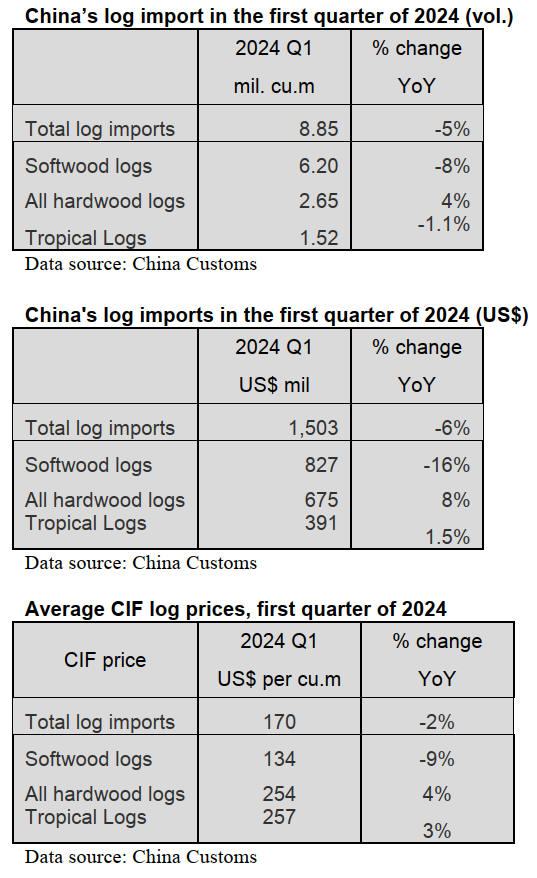
Hardwood log imports rose 4% in the first quarter of 2024
compared to the same period in 2023 to 2.65 million cubic
metres, accounting for 30% of the national total. The
average price for imported hardwood logs rose 4% to
US$254 (CIF) per cubic metre over the same period of
2023.
Of total hardwood log imports, tropical log imports were
1.52 million cubic metres valued at US$391 million CIF,
down slightly in volume (1%) but up 1.5% in value from
the same period of 2023. Tropical logs accounted for 17%
of the national total log import volume.
The average price for imported tropical logs was US$257
CIF per cubic metre, up 3% from the same period of 2023.
Sharp decline in log imports from Germany
China’s log imports from Germany dropped 65% to
413,000 cubic metres valued at US$62 million, both
declining by 68% in the first quarter of 2024. The average
CIF price for China’s log imports from Germany fell 10%
to US$150 per cubic metre.
The dramatic decline in China’s log imports from
Germany was because the Russia-Ukraine conflict has led
to a general rise in energy prices in Europe and the costs
of major manufacturing and industrial production in
Germany have increased significantly.
Germany has lost its position as the second largest supplier
of log to China, ranking just sixth in the first quarter of
2024.
New Zealand still was the largest supplier of logs to China
in the first quarter of 2024. China’s log imports from New
Zealand rose 13% to 4.29 million cubic metres valued at
US$552 million, both up 12% over the same period of
2023. The average CIF price for log imports from New
Zealand fell 2% to US$129 per cubic metre.
The proportion of China’s log imports from New Zealand
accounted for 48% of the total log imports volume.
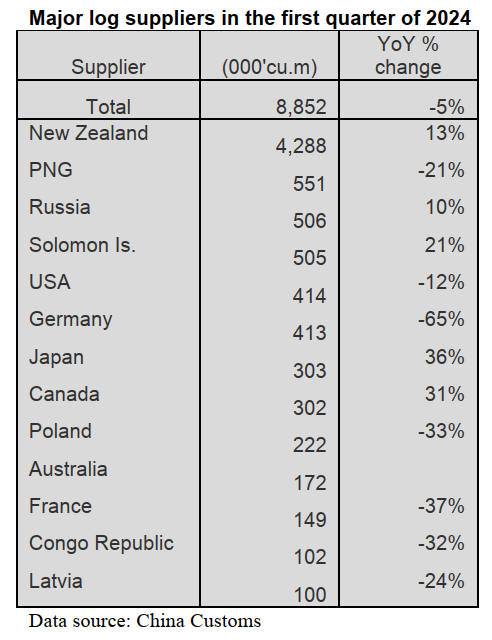 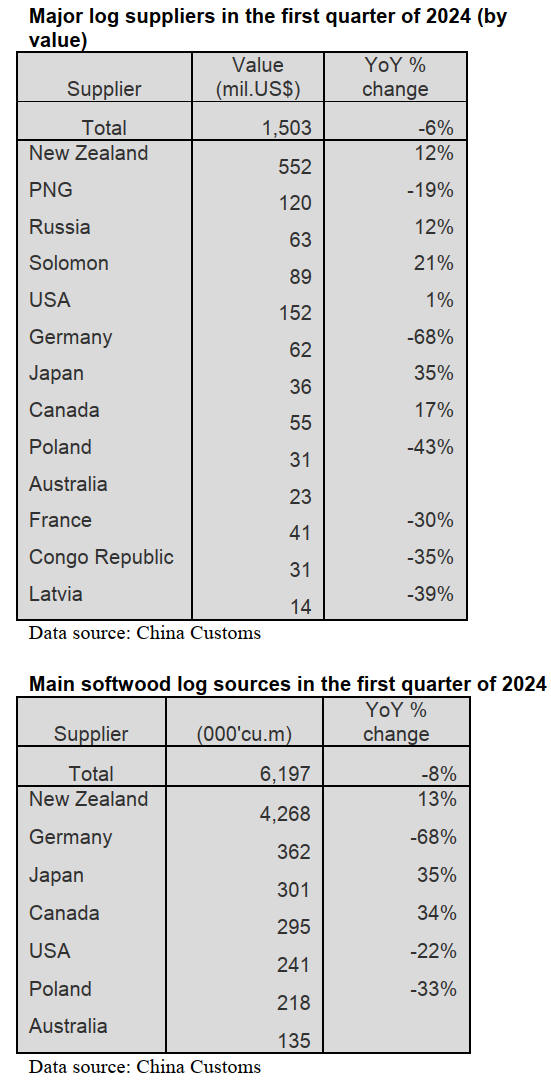
Slight decline in tropical log imports
China’s tropical log imports fell 1% to 1.519 million cubic
metres in the first quarter of 2024. The top three suppliers
of tropical logs to China in the first quarter 2024 were
Papua New Guinea (36%), Solomon Islands (33%) and the
Republic of Congo (7%). 76% of China’s tropical log
imports were from these three countries in the first quarter
of 2024.
China’s tropical log imports from Solomon Is. rose 21%
but from PNG and the Republic of Congo shipped
volumes fell 21% and 32% respectively in the first quarter
of 2024 and this was the main reason for the decrease in
the total tropical log imports. Notably, China's imports of
logs from Mozambique and Bolivia rose sharply in the
first quarter of 2024. After a period of downturn African
logs are experiencing a strong appeal in the Chinese
market once again.
China’s log imports from African countries rose 3% to
387,000 cubic metres in the first quarter of 2024.
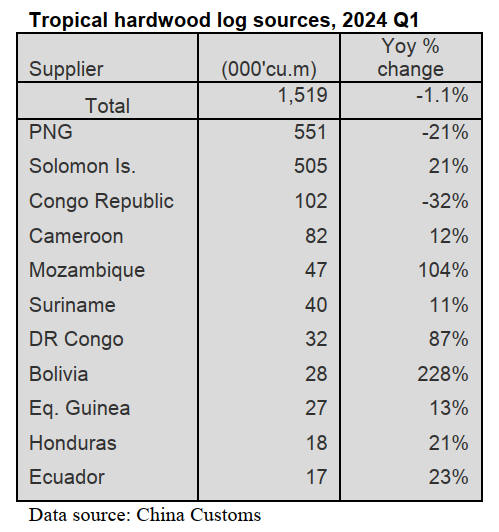
Rise in CIF prices for tropical log imports
The average CIF price for China’s tropical log imports
rose 3% to US$257 per cubic metre in the first quarter of
2024. The average CIF prices for China’s tropical log
imports from PNG and Mozambique grew 2% and 3%
respectively.
In contrast, the CIF prices for China’s tropical log imports
from the other top suppliers declined.
It is worth noting that the CIF price for China’s tropical
log imports from the Democratic Republic of Congo fell
45%, in addition, CIF prices for logs from Bolivia and
Honduras declined 16% and 12% respectively.
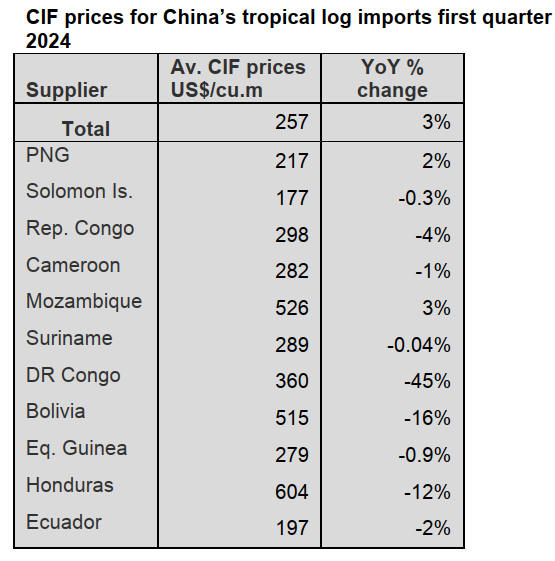
Global Green Supply Chain (GGSC) report for April
In April the GTI-China index registered 52.3%, a decrease
of 14.5 percentage points from the previous month and has
been above the critical value (50%) for 2 consecutive
months indicating that the business prosperity of the
enterprises represented in the GTI-China index expanded.
However, due to the decline in international demand for
wood products the expansion slowed. Feedback from a
sample of enterprises says some home furnishing
companies in China are actively seeking to strengthen
investment cooperation with developing countries where
market demand is stronger.
As for the 11 sub-indices, three, export orders, existing
orders and inventory of main raw materials were below the
critical value of 50% and the remaining 8 indices were all
above the critical value. Compared to the previous month
the indices for purchase price, inventory of main raw
materials and delivery time increased while the remaining
8 indices declined by 3.5-24.6 percentage points.
Challenges reported by repondents for April
It was difficult to recruit workers, demand from the
downstream markets declined, there was an imbalance
between production and sales, with production exceeding
the sales, it was difficult to procure raw materials such as
European oak veneer, the overall economy of the country
contracted and there was overcapacity in the sector.
For some enterprises the business performance was poor
and cash flow pressures existed, in particular the
woodpanel industry experienced fierce competition and
the market was saturated.
The following suggestions were made:
Increase financing efforts, implement macro-regulations
and controls, relax loan policies for enterprises, increase
the proportion of exports and shift marketing to Southeast
Asia, stabilise the supply of raw materials and the
woodpanel markets.
It was suggested that the government conduct coordination
within and outside the country to improve the business
environment through diversifying foreign markets and
implement promotion at home and abroad. To succeed the
sector needs to improve product quality, develop new
products and explore new enduses.
Through the eyes of industry
The latest GTI report lists the challenges identified by the private
sector in China.
GGSC
https://www.itto-ggsc.org/static/upload/file/20240418/1713424567120852.pdf
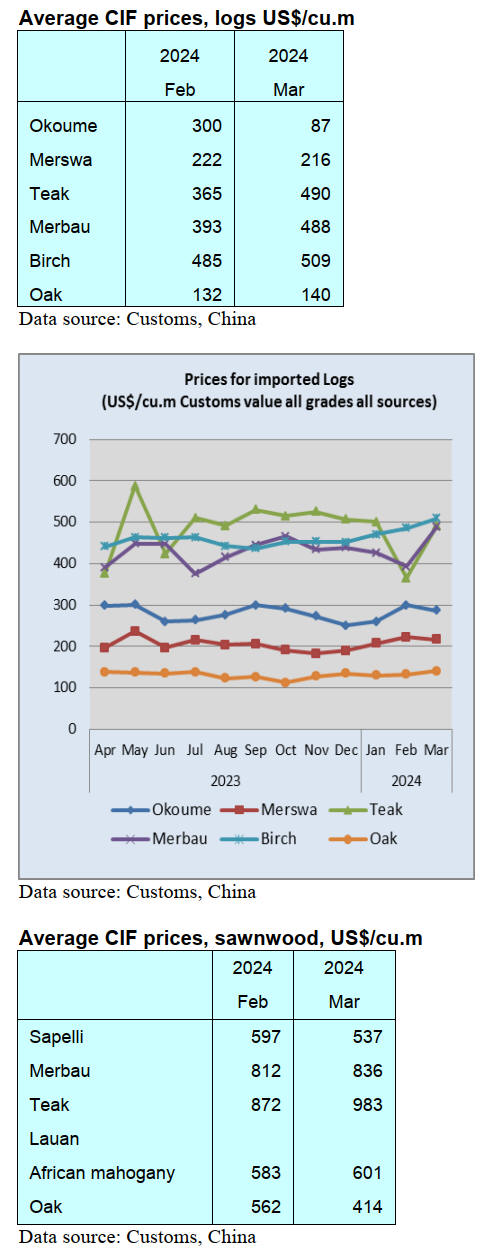
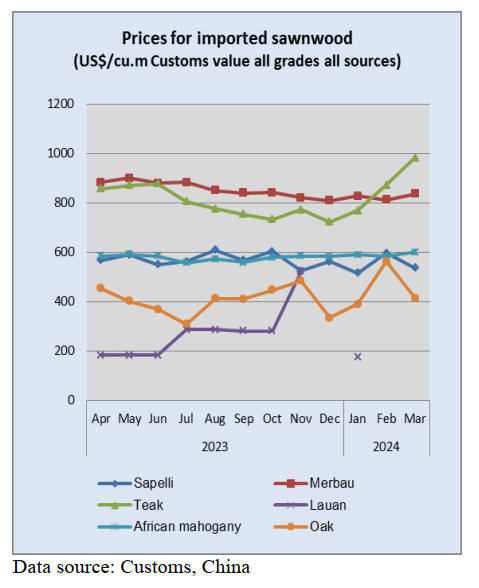
|